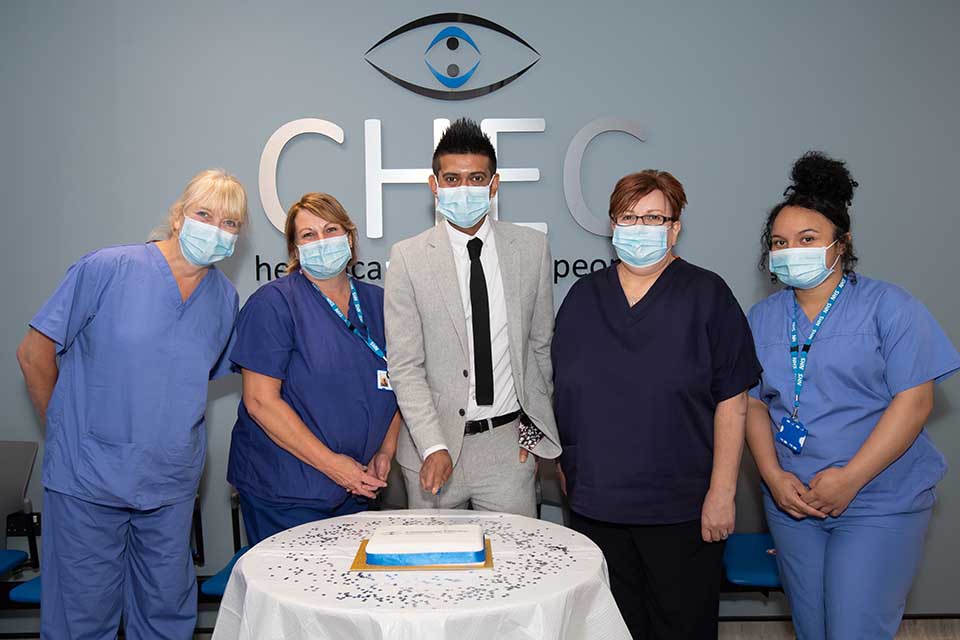- OT
- Industry
- High Street
- Community Eyecare: Becoming part of the local health economy
Community Eyecare: Becoming part of the local health economy
The provider of community-based ophthalmology services has opened a new facility in Coventry for cataract, wet AMD, and ophthalmology services

05 October 2021
Community Eyecare, a provider of community-based ophthalmology services in the UK, has opened a new Cataract and Surgical Centre in Coventry.
With the new facilities, the provider said it aims to reduce waiting times in ophthalmology for patients, and reduce pressure on the NHS.
The new surgical centre is approximately 8000 square feet in size, with seven consulting rooms, two diagnostic rooms, an operating theatre, an endoscopy suite, and staff areas.
Discussing the decision to open the new centre, Imran Rahman, chief executive officer for Community Eyecare and consultant ophthalmologist, explained that, with the company contracted to deliver wet age-related macular degeneration (AMD) services in the Coventry and Rugby area, it had also seen a lot of additional patients from its South Warwickshire contract.
He said: “We have been contracted for five years in both areas, so it made logical sense to provide a full offering of services, including w-AMD, cataract, general ophthalmology and YAG laser.”
Ensuring the new centre is accessible and easy to locate, the facility is based in a business park, close to a shopping centre. Rahman shared: “We use location, practicality, and ease of access as criteria for locating a site.”
The centre can also be flexible to patients’ needs, with services offered outside of typical work days and hours.

The new facility was officially opened at the start of September by the Mayor of Coventry and welcomed its first patient on 14 September.
Community Eyecare began in 2012 and aims to support local health services. Rahman explained: “Our long-term goal is to be a strategic partner to the NHS and to ease the pressure by reducing ophthalmology waiting times for patients. That is why we are building fixed units in a variety of areas, so that we become a part of the health economy locally.”
Discussing the patient backlog in ophthalmology, Rahman shared: “the highest speciality of outpatient numbers in the UK out of all the specialities has peaked in some areas, as they have almost 80,000 patients on the backlog as an acute trust.
“We intend to support the local trust. They can direct patients that are likely going to be long-term and complex patients to us, so that they can continue dealing with the pandemic and COVID-19 patients,” Rahman said.
Q&A: Dhiren Varand, hospital manager for the Coventry Cataract and Surgical Centre, shares his view on the new facilities
What does it mean for you and the team to be operating from this new facility?
Dhiren Varand (DV): It is an absolute honour to be a part of a company that is growing at such a rate to support the NHS and change the lives of the local community. It is a new, modern facility that is tailored to the needs of the demographics we are trying to support.
How have patients responded to the facilities?
DV: I was quite overwhelmed by the sheer volume of patients that gave us such positive feedback from our first clinic. To have patients get into contact just days after their procedure, informing us of just how much of a change it’s made to their eyesight, makes our jobs worth the while.
Following the pandemic, and with the opening of these new facilities, how do you feel about your hospital in the months ahead?
DV: We want to support the NHS and the local community as much as we can. That’s the reason why we’re here. We provide better healthcare for local people. We will continue to build relationships with patients and partners, ensuring we always remain responsive and considerate to their needs.
The impact of the pandemic
Reflecting on his experience of the past 18 months, Rahman told OT: “It has been very interesting as a healthcare professional and a consultant.”
While Rahman has been accustomed to infection prevention measures “day-in and day-out,” the emphasis has only increased during the pandemic, with personal protective equipment becoming ever more important and enforced.
“But our day-to-day work hasn’t changed,” Rahman shared. “It’s deviated in terms of the patient cohort and our processes as we now cater for COVID-19 patients – because everyone needs to be seen, regardless of if they have COVID-19 – we are in isolated rooms with increased protection.
“So, from a clinical point of view, our training has allowed us to carry on and function as normal,” he said.
Considering the months ahead for Community Eyecare, Rahman suggested it could play a supportive role for the NHS, particularly in the “drive” to reduce the waiting list for patients.
“Medical professionals are talking about the waiting list having peaked at 15 million patients, and a lot of those are likely ophthalmology-based,” he said.
The ramifications of this could also stretch beyond eye health, he illustrated, suggesting patients who have issues with their eyes or a vision impairment also face a higher risk of trips and falls, particularly in the older demographic of patients. “These patients could end up requiring hip replacements and other procedures that require them to be hospitalised, causing more pressure and strain on the NHS.”
“The care that Community Eyecare provides is a preventative measure as well as a restorative commission,” Rahman continued. “Last year there was a news article about an NHS patient who was on the waiting list for cataract surgery, and unfortunately, they tripped and died on impact all due to their vision. If we can prevent just one more death by providing NHS services with shorter waiting times, we are thankful.”


Comments (0)
You must be logged in to join the discussion. Log in